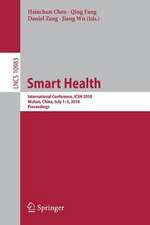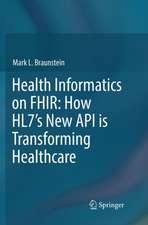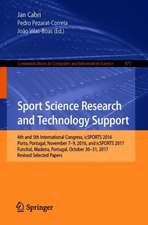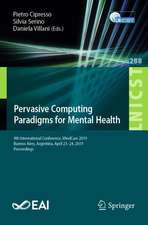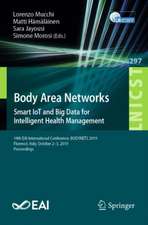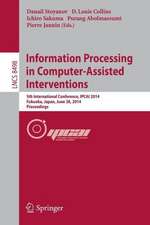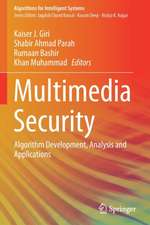Artificial Intelligence for Innovative Healthcare Informatics
Editat de Shabir Ahmad Parah, Mamoon Rashid, Vijayakumar Varadarajanen Limba Engleză Paperback – 25 mai 2023
| Toate formatele și edițiile | Preț | Express |
|---|---|---|
| Paperback (1) | 1096.45 lei 6-8 săpt. | |
| Springer International Publishing – 25 mai 2023 | 1096.45 lei 6-8 săpt. | |
| Hardback (1) | 1103.39 lei 6-8 săpt. | |
| Springer International Publishing – 24 mai 2022 | 1103.39 lei 6-8 săpt. |
Preț: 1096.45 lei
Preț vechi: 1154.16 lei
-5% Nou
Puncte Express: 1645
Preț estimativ în valută:
209.80€ • 219.07$ • 173.25£
209.80€ • 219.07$ • 173.25£
Carte tipărită la comandă
Livrare economică 15-29 aprilie
Preluare comenzi: 021 569.72.76
Specificații
ISBN-13: 9783030965716
ISBN-10: 3030965716
Ilustrații: VI, 327 p. 94 illus., 79 illus. in color.
Dimensiuni: 155 x 235 mm
Greutate: 0.47 kg
Ediția:1st ed. 2022
Editura: Springer International Publishing
Colecția Springer
Locul publicării:Cham, Switzerland
ISBN-10: 3030965716
Ilustrații: VI, 327 p. 94 illus., 79 illus. in color.
Dimensiuni: 155 x 235 mm
Greutate: 0.47 kg
Ediția:1st ed. 2022
Editura: Springer International Publishing
Colecția Springer
Locul publicării:Cham, Switzerland
Cuprins
Section 1: Medical Image Analysis using Artificial Intelligence.- Use of Deep Learning in Biomedical Imaging.-Detection of Breast Cancer Masses in Mammogram Images with Watershed Segmentation and Machine Learning Approach.- Cloud-based Glaucoma Diagnosis in Medical Imaging using Machine Learning.- Leucocytic Cell Nucleus Identification using Boundary Cell Detection algorithm with Dilation and Erosion based Morphometry.- Effective Prediction of Autism Using Ensemble Method.-Section 2: Artificial Intelligence (AI) Classification Models for COVID-19 Pandemic.-Automatic Classification of COVID-19 infected patients using Convolution Neural Network Models.-AI-Based Deep Random Forest Ensemble Model for Prediction of COVID-19 and Pneumonia from Chest X-Ray Images.- Section 3: Use of AI-Enabled IoT in Healthcare.- Internet of Things and Artificial Intelligence in Biomedical Systems.-Role of IoT in Healthcare Sector for Monitoring Diabetic Patients.- Section 4: Applications of Artificial Intelligence in Healthcare.- Low-Rank Representation based approach for subspace segmentation and clustering of biomedical image patterns.-Performance Comparison of Imputation Methods for Heart Disease Prediction.- Ayurnano: A solution towards herbal therapeutics using Artificial Intelligence approach.- Artificial Intelligence in Biomedical Education.- The Emergence of Natural Language Processing (NLP) Techniques in Healthcare AI.- Prospects and Difficulties of Artificial Intelligence (AI) Implementations in Naturopathy.
Notă biografică
Shabir A Parah received his Ph.D. degree in Electronics from the University of Kashmir, Srinagar in 2013 in the field of Image processing. He is currently an Assistant Professor with the Department of Electronics and IT, University of Kashmir. He has authored or co-authored 150+ papers in the journals and conferences of international repute. His fields of interest are multimedia signal processing, secure communication, smart health, IoMT and Spintronics. He is member of many professional organization like IEEE, IAENG, IEA etc.
Mamoon Rashid is Assistant Professor in Department of Computer Engineering, Faculty of Science and Technology, Vishwakarma University, Pune, India. He has published 80+ papers indexed in SCI/SCIE journals and Conferences of International repute. He is a regular contributor to monthly Editorial of CSI Communications and serves as in Editorial Review Board for many journals. His research interests include Big Data Analytics, Machine Learning, Neuro Imaging, & Image Processing.
Vijayakumar Varadarajan is currently an Adjunct Professor in School of Computer Science and Engineering, University of New South Wales, Sydney, Australia. He is also a Data Science Advisor for Brite Yellow Pvt Ltd United Kingdom, He was a Professor and Associate Dean for School of Computing Science and Engineering at VIT University, Chennai, India. He has more than 18 years of experience including industrial and institutional.. He has completed his PhD from Anna University in 2012. He has published many articles in national and international level journals/conferences/books. He has initiated a number of international research collaborations with universities in Europe, Australia, Africa, Malaysia, Singapore and North & South America. His research interests include computational areas covering grid computing, cloud computing, computer networks, cyber security and big data. He is also a member of several national and international professional bodies including IFSA, EAI, BIS, ISTE, IAENG, CSTA, IEA.
Vijayakumar Varadarajan is currently an Adjunct Professor in School of Computer Science and Engineering, University of New South Wales, Sydney, Australia. He is also a Data Science Advisor for Brite Yellow Pvt Ltd United Kingdom, He was a Professor and Associate Dean for School of Computing Science and Engineering at VIT University, Chennai, India. He has more than 18 years of experience including industrial and institutional.. He has completed his PhD from Anna University in 2012. He has published many articles in national and international level journals/conferences/books. He has initiated a number of international research collaborations with universities in Europe, Australia, Africa, Malaysia, Singapore and North & South America. His research interests include computational areas covering grid computing, cloud computing, computer networks, cyber security and big data. He is also a member of several national and international professional bodies including IFSA, EAI, BIS, ISTE, IAENG, CSTA, IEA.
Textul de pe ultima copertă
There are several popular books published in Healthcare Computational Informatics like Computational Bioengineering and Bioinformatics (2020), Springer; Health Informatics (2017), Springer; Health Informatics Vision: From Data via Information to Knowledge (2019), IOS Press; Data Analytics in Biomedical Engineering and Healthcare (2020), Elsevier. However, in all these mentioned books, the challenges in Biomedical Imaging are solved in one dimension by use of any specific technology like Image Processing, Machine Learning or Computer Aided Systems. In this book, the book it has been attempted to bring all technologies related to computational analytics together and apply them on Biomedical Imaging.
Caracteristici
This book will provide a unique compendium of current and emerging DL/ML based AI paradigms for healthcare informatics The book also describes key technical issues with AI for healthcare Propose solutions and most importantly dwell on handling security breaches in AI driven healthcare



